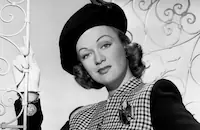My Reputation

Brief Synopsis
Cast & Crew
Curtis Bernhardt
Barbara Stanwyck
George Brent
Warner Anderson
Lucile Watson
John Ridgely
Film Details
Technical Specs

Synopsis
After her husband Paul dies in 1942, Lake Forest, Illinois society woman Jessica Drummond is left alone to rear her two sons, Kim and Keith. Family friend Frank Everett advises Jess that although Paul set up a trust fund for their sons' education, her income will be reduced. As Frank is leaving, Jess's mother, Mrs. Kimball, arrives. When Jess announces that she doesn't intend to wear mourning, her mother warns her that people of their class must wear it. She, herself, has worn black since the death of Jess's father twenty-five years earlier. Jess has been left on her own for an evening when the boys are invited to a party the night before they are to leave for boarding school. Jess meets her friend, Ginna Abbott, for lunch and frets about living alone. Later they are joined by George Van Ormand, the husband of another friend, who offers to drive Jess home. When he attempts to kiss her, Jess rebuffs him, and hurriedly leaves to spend the night with Ginna. Ginna advises Jess to be herself for a change and invites her to join her and her husband Cary on a ski trip to California. On the slopes Jess meets Major Scott Landis, who quickly becomes attracted to her. Still distraught over Paul's death, however, Jess sends him away and returns home to Lake Forest. With the boys away, Jess becomes lonely, and when Frank drops in, she invites him for dinner. While they are eating, Ginna telephones to tell Jess that Scott is in town and suggests that she and Frank join them at the club. Scott, who is at the club with an old girl friend, tells Jess that he is now stationed in the area and invites her out. She meets him at his apartment and is seen by a friend of her mother. After hearing gossip about Jess, Mrs. Kimball lectures her daughter about the importance of maintaining her reputation. Jess refuses to be browbeaten, however, and invites Scott to her home for Christmas Eve. At that time, Mrs. Kimball, who dislikes Scott, calls him "a scalawag in league with the devil." Scott responds that he never wanted to get married and recommends that Jess marry Frank. Later, at a New Year's Eve party, Scott tells Jess he has been ordered overseas, and Jess decides to go to New York with him until he leaves. When she announces her trip to her sons, who have heard gossip about Jess and Scott, they run away to their grandmother. The boys accuse Jess of lying to them and of having forgotten their father. Although she explains that she was very lonely after Paul's death, their distress causes her to forgo her plans, and she says goodbye to Scott in Chicago. He then promises to return.

Director

Curtis Bernhardt
Cast

Barbara Stanwyck

George Brent

Warner Anderson

Lucile Watson

John Ridgely

Eve Arden

Jerome Cowan
Esther Dale

Scotty Beckett
Bobby Cooper

Leona Maricle
Mary Servoss

Cecil Cunningham
Janis Wilson

Ann Todd
Nancy Evans
Oliver Prickett
Charles Jordan
Darwood Kaye
Fred Kelsey

Marjorie Hoshelle
Bruce Warren
Harry Seymour
Frank Darien
Hugh Prosser
Helen Eby Rock
Alan Ward
Dan Dowling
Tom Quinn
Elyse Brown
Rosalie Roy
Dick Humphreys
Marilyn Kay
Shirley Doble
Dale Cornell
Deacon Mcdaniel
Dick Winslow
Dick Elliott
Leah Baird
Ellsworth Blake
Crew
Henry Blanke
Everett A. Brown
Roy Davidson
Leo F. Forbstein
Jack Gage
Anton Grot
Edith Head
George James Hopkins
James Wong Howe
Max Steiner
Catherine Turney
Jack L. Warner
David Weisbart
Perc Westmore

Photo Collections
Videos
Movie Clip



Trailer
Hosted Intro
Film Details
Technical Specs

Articles
My Reputation
With her two young sons away at school, Jessica becomes desperately lonely and takes a much needed ski vacation with her fun-loving friends Ginna (Eve Arden) and Cary Abbott (John Ridgely) in Lake Tahoe. There, Jessica meets a handsome, charming Army Major Scott Landis (George Brent) who is reluctant to marry and settle down. Back in Lake Forest, the gossip mill works overtime as friends and Jessica's straight-laced mother (Lucile Watson) view her blossoming romance with Major Landis with suspicion. Jessica's mother wants her to marry their conservative family lawyer Frank Everett (Warner Anderson). But when Major Landis is reassigned to Chicago, Jessica finds herself choosing passion and an uncertain romantic future over the thought of a safe, loveless marriage with Frank.
Director Curtis Bernhardt (Million Dollar Baby, 1941, A Stolen Life, 1946) directs this moody melodrama with some of the genre's usual undercurrents of social critique. Despite some soap opera tendencies, My Reputation is frank about how women's lives are often harshly dictated by their community, family and children, including Jessica's two young sons Kim (Scotty Beckett) and Keith (Bobby Cooper) who react with horror to their mother's high-profile romance with Major Landis.
Like several other Warner Bros. productions made during World War II, My Reputation was only screened for military use in 1944. The studio believed the film would be better received by the public at the end of the war, and thus held it back for a 1946 release.
My Reputation was adapted by Catherine Turney (Of Human Bondage, 1946, A Stolen Life) from the Clare Jaynes awkwardly titled novel Instruct My Sorrows.
It is Barbara Stanwyck's typically compelling screen presence which makes for a convincing portrait of a woman debilitated by loneliness and chafing under social strictures in My Reputation. Nominated four times for an Academy Award for Best Actress (Stella Dallas, 1937; Ball of Fire, 1941; Double Indemnity, 1944; Sorry, Wrong Number, 1948), Stanwyck never won an Oscar®. However, in 1981 she was given an honorary Oscar® for her "unique contribution to the art of screen acting." From 1964 - 1968, she made a successful jump to television in her role on "The Big Valley," which won her a second Emmy Award.
Born Ruby Stevens in 1907 Brooklyn, Stanwyck was orphaned at age four and raised by her older sister and later became a Ziegfeld chorus girl. In Hollywood, Stanwyck had a reputation in a movie business more often known for attitude and vanity, as an unpretentious, consummately professional, hardworking actress. Though Stanwyck ironically first screen-tested for Warner Bros., upon arriving in Hollywood, her test was rejected. She was eventually picked up by Columbia and loaned to Warners in 1931's Illicit. The two studios eventually struck a deal to share the enormously popular rising star between them. Though Stanwyck initially played tough working class women in films like Baby Face (1933) and Night Nurse (1931), her range proved enormous, as she took on screwball comedy, melodrama, film noir and played every station on the class spectrum, from respectable wealthy women like Jessica Drummond to the murderous and duplicitous femme fatale Phyllis Dietrichson in Billy Wilder's brilliant film noir Double Indemnity (1944). That film made Stanwyck, according to the IRS, the highest paid woman in America.
Director: Curtis Bernhardt
Producer: Henry Blanke
Screenplay: Catherine Turney from the novel by Clare Jaynes
Cinematography: James Wong Howe
Production Design: Anton Grot
Music: Max Steiner
Cast: Barbara Stanwyck (Jessica "Jess" Drummond), George Brent (Major Scott Landis), Lucile Watson (Mrs. Mary Kimball), Warner Anderson (Frank Everett), Eve Arden (Ginna Abbott), John Ridgely (Cary Abbott).
BW-94m. Closed captioning.
by Felicia Feaster

My Reputation
Quotes
Trivia
Notes
The film begins with a quotation from the William Shakespeare play Othello: "Who steals my purse steals trash...but he that filches from me my good name robs me of that which not enriches him, and makes me poor indeed." Hollywood Reporter news items add the following information about the production: Edith Head was borrowed from Paramount to design Barbara Stanwyck's costumes. The production closed down for a week in December 1943 and for another week in January 1944 due to Stanwyck's illness with the flu. This was George Brent's final film for Warner Bros. Barbara Stanwyck and George Brent reprised their roles in a Lux Radio Theatre broadcast on April 21, 1947.
















